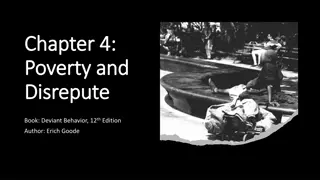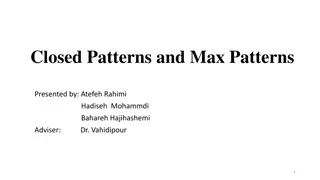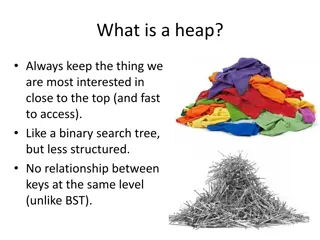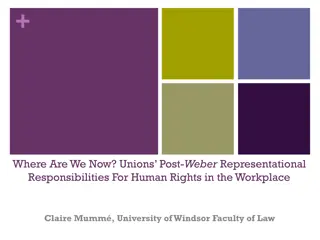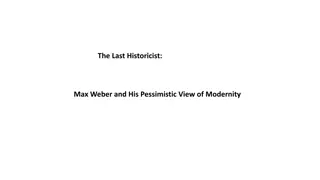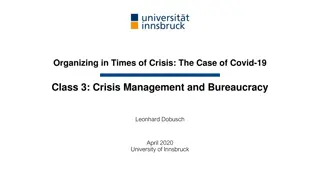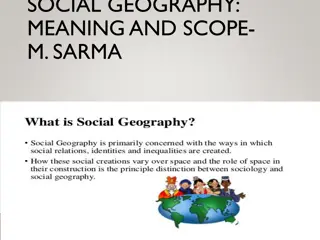Understanding Types of Social Action According to Max Weber
Max Weber's sociology delves into the consequences of different types of social action, exploring how these actions can conflict and create tensions in society. Weber's typology categorizes social action into rational-purposeful, value-rational, affective, and traditional actions, highlighting the complexities and goals underlying human behavior.
Download Presentation

Please find below an Image/Link to download the presentation.
The content on the website is provided AS IS for your information and personal use only. It may not be sold, licensed, or shared on other websites without obtaining consent from the author. Download presentation by click this link. If you encounter any issues during the download, it is possible that the publisher has removed the file from their server.
E N D
Presentation Transcript
Social Action 6th Semester, BS Social Work Department of Social Work, University of Peshawar Instructor: Asif Khan
Types of Social Action According to MaxWeber At the heart of Weber s sociology is an investigation of the consequences of types of social action and a study of how these types of action come into conflict and create tensions for specific pointed out that in many traditional societies individuals live highly wherein every day ceremonies are generally seen as ends in themselves. individuals. Weber routinized lives
Contnd This type of action is very different from the action of modern individuals who have to adopt a great many highly specific roles that require them constantly to shift perceptions and allegiances. For the modern individual the ultimate ends of action are often far removed from the specific rules and norms that guide everyday behaviour. In order to clarify the important differences among types of social action and differentiate between rational and non-rational action, Weber developed the following typology:
Contnd 1. Rational-purposefulAction 2. Value-rational Action 3. Affective Action 4. Traditional Action
1. Rational-purposefulAction: This action may be rationally expedient if it is based on logical or scientific grounds. This action entails a complicated plurality of means and ends. The ends of action (for example goals, values) are either taken as means to the fulfillment of other ends, or are treated as if they are set in concrete. In this way action becomes purely instrumental. Example: If we compare two individuals who are trying to maximize their income over the course of a year, we might find that one person uses far more effective means to achieve this goal than the other. He might cheat on his tax return, take a second job or sell drugs to workmates. We would describe the individuals as more purposively rational than one who acquires and keeps less money.
Contnd Within the domain of zweck-rational action it is possible to compare the degrees of rationality that various individuals exhibit. In the above example, it is assumed that all individuals will want to maximise their income. This goal is fixed and it is also a means to other goals for example buying a new car, spending vacation in some hill stations,moving around European Countries etc. Classical economic theory treats individuals as if they were rationally purposeful. According to this theory, individuals will always try to maximize their utility. According to Weber, action cannot be meaningful unless it is goal oriented. Rational action in relation to a goal corresponds roughly to Pareto s logical action. It is the action of the engineer who is building a bridge or the General who wants to win a victory. In all these cases zweckrational action is distinguished by the fact that the actor conceives his goal clearly and combines means with a view to attaining it
2. Value-rational Action: Action is rational in relation to a specific value. This action occurs when individuals use rational that is effective means to achieve goals or ends that are defined in terms of subjective meaning. According to Weber,when individuals are value rational, they make commitments subjective goals and adopt means that are effective in attaining these ends. to certain
Contnd.. Here, means are chosen for their efficiency but the ends are determined by value.For example,a soldier laying down his life for the country. His action is not directed towards attaining specific material goal like wealth.It is for the sake of certain values like honour and patriotism. Weber s differentiation between the two basic types of rational action is of greatest importance. The first is the means- end rationality. The action that is determined by expectations as to the behaviour of objects in the environment and other human beings.These expectations are used as conditions or means for the attainment of the actors own rationally pursued and calculated ends. The second is value rationality, or action that is determined by a conscious belief in the value for its own sake of some ethical, aesthetic, religious or other independently of its prospects for success. forms of behaviour,
3. Affective Action: Affective action fuses means and ends together so that action becomes emotional and impulsive. Such action is the antithesis of rationality because the actor concerned cannot make calm, dispassionate assessment of the relationship between the ends of action and the means that supposedly exist to serve these ends. Rather the means themselves are emotionally fulfilling and become ends in themselves. This kind of action results from the emotional state of mind of the actor. If someone is teasing a girl in a bus, she may get so irritated that she may slap the offending person. She has been provoked so much that she has reacted violently. In this example,the action is defined not with reference to a goal or system of values, but by the emotional reaction of an actor placed in a given set of circumstances
4. Traditional Action: Traditional action occurs when the ends and the means of action are fixed by custom and tradition. For example, some so-called primitive societies have very strict rites of succession for group leaders. What is important about traditional action is that the ends of action are taken for granted and appear to be natural to the actors concerned because comprehend the possibility of alternative ends. This is an action which is guided by customs and long standing beliefs which become second nature or habit. In traditional Indian Society doing pranam or namaskar to elders is almost second nature needing no prompting. they are unable to





